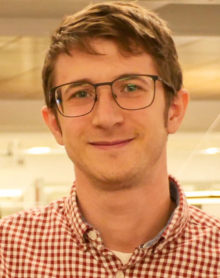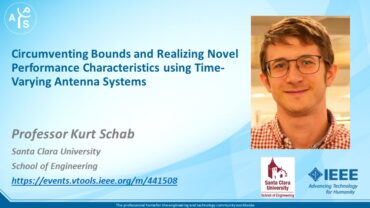Virtual Lunch Seminar
Register: https://events.vtools.ieee.org/m/441508
Title: Circumventing Bounds and Realizing Novel Performance Characteristics Using Time-Varying Antenna Systems
Location: Virtual (Zoom link will be sent to registered attendees the day before and again day of the event).
Speaker: Kurt Schab

Abstract: Fundamental physical limits apply to many key antenna performance parameters (gain, Q-factor, efficiency), particularly when device dimensions are small relative to operating wavelengths – the “electrically small” regime. These limitations cannot be exceeded by linear time-invariant (LTI) devices, and can manifest as critical bottlenecks for communications and sensing technology.
In this talk, we survey recent work on moving antenna technology away from the classical LTI design paradigm and toward active, non-linear, and time-varying systems. Emphasis is placed on research incorporating time-varying elements into antennas and matching networks with the goal of exceeding physical bounds on LTI antenna metrics. This includes direct antenna modulation (DAM), which treats time-varying antennas and matching networks as active parts of the modulation process, allowing for efficient, extreme instantaneous radiated signal bandwidths from electrically small apertures. Additionally, the co-design of electrically small antennas with parametric pumping networks for broadband, low-noise receive applications will be presented.
Modeling challenges and simulation approaches for time-varying radiators will be discussed and several theoretical concepts in the area of time-varying antennas will also be surveyed, including the extension of effective aperture to time-varying antennas and the effect of cross-frequency coupling on the effective receiver noise temperature.
Bio: Kurt Schab is an Associate Professor of Electrical and Computer Engineering at Santa Clara University in Santa Clara, CA USA. He received BS degreesin Physics and Electrical Engineering from Portland State University in 2011 and the MS and PhD degrees in Electrical Engineering from the University of Illinois at Urbana-Champaign in 2013 and 2016. From 2016 to 2018, he was a Postdoctoral Research Scholar at North Carolina State University. His work has been supported by various federal agencies and defense organizations, including two ongoing projects under IARPA EQuAL-P. In 2023 he received the IEEE Antennas and Propagation Society Altshuler Prize Paper Award for his co-authored review of computational methods in characteristic mode analysis. His current research portfolio focuses on the intersection of electromagnetic theory, computational methods, and antenna design; particularly in regards to physical bounds and systems involving time-varying media.

